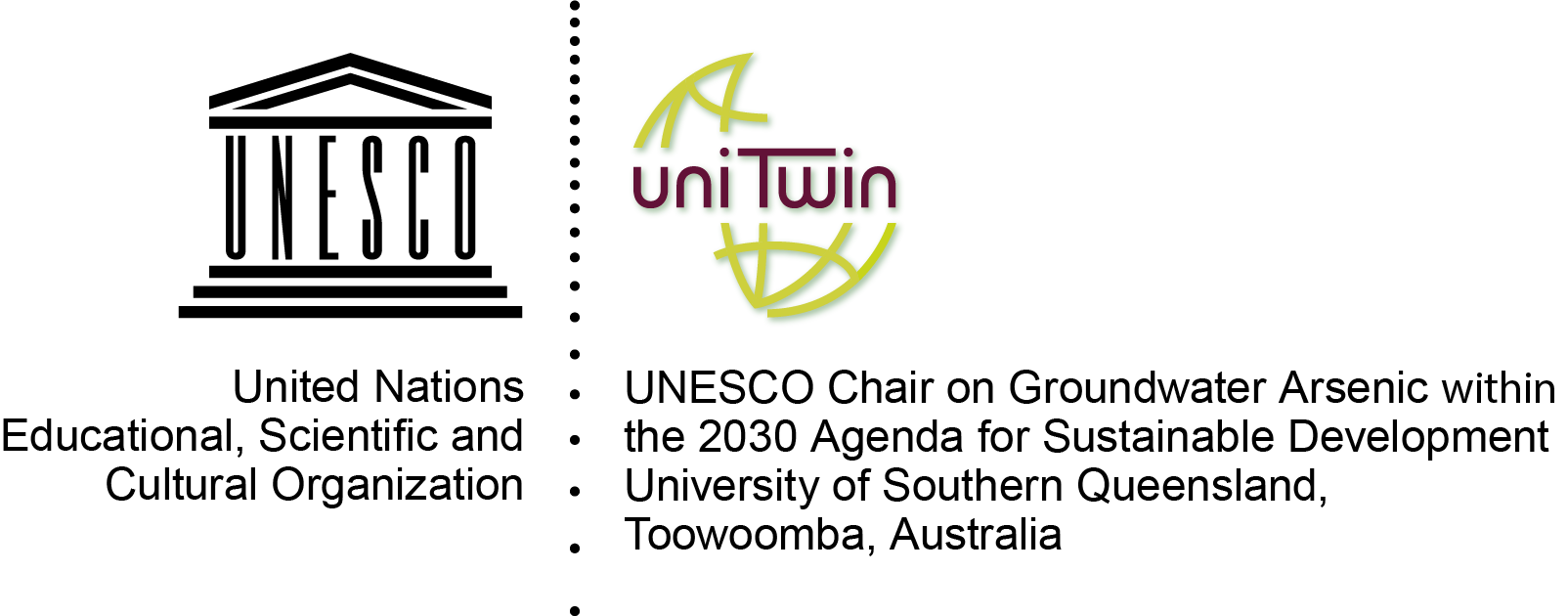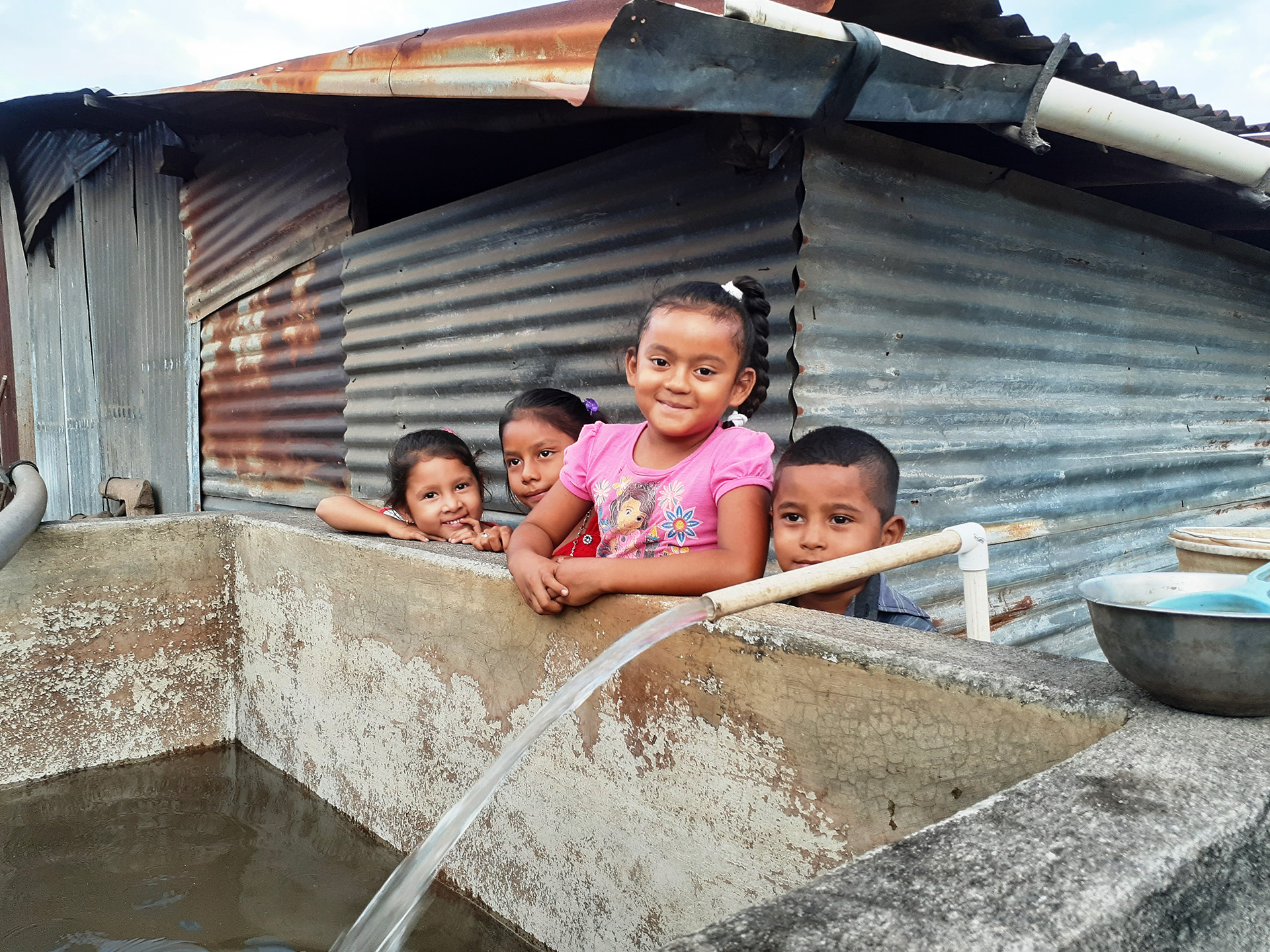Context and Justification
A Global Umbrella for Action
To address and improve the global arsenic problem, a host facility functioning as a global umbrella for coordinated transdisciplinary capacity building and knowledge repository is required. The host will facilitate research, postgraduate and professional training, with a focus on growing a strong global network.
Links between universities and other stakeholders will be strengthened. Sources of information and integrated approaches will be utilised for knowledge-transfer, thereby allowing the linkage of the occurrence of geogenic arsenic, contamination of predominantly ground and surface water, soil, plant and air with their effects on humans. Direct solutions with considerable technological perspective and socio-economic and environmental concerns will be leveraged.
The socio-economic aspects need to be carefully addressed, as domestic water collection and usage are traditionally significant responsibilities for women, particularly in lower income arsenic-endemic regions. Thus, it is imperative, that women are included in planning and decision making at a community level.
Science for Society
- Desirable environmental, socio-economic outcomes are lacking/insufficient and must be improved by academia.
- This will be achieved through better cooperation and collaborations within the local and international scientific communities.
- Awareness creation, exchanging knowledge, providing strong scientific-based information for general public communities will lead to better outcomes.
Our Values
Our Purpose
Integrating Arsenic into the SDGs
We believe that independent and credible transdisciplinary arsenic research, and its nexus to environment, food, public health, energy and Sustainable Development Goals (SDGs), which drive innovative solutions for sustainable integrated management of water resources, is a pillar for protecting our globe and humanity. State-of-the-art integrated water-energy-food-climate-ecosystem solutions will greatly help in safeguarding water, energy and food supplies, while protecting human health and well-being.
Our Vision
Human development living with arsenic
The UNESCO Chair has the vision of an economically profitable but sustainable and social and environmentally sound utilisation and management of water resources, where all societal groups, regardless of financial stature or gender, can equally benefit in future generations. Thereby a highlight of special interest is that the UNESCO-As-Chair advocates the crucial role of women i.e. the gender dimension in science and technology. This recognises that women play a critical role in solving global water, sanitation and public health problems.
Our Mission
Build a strong global network and umbrella
The UNESCO Chair is a knowledge base and independent leadership think-tank for researchers, developers, industries and policy makers alike. Especially on topics related to global arsenic problems, seeking innovative ideas and allowing implementation of world’s best practices. This will be done through strengthening collaborations within local and international scientific communities and society, providing strong scientific-based credible information to both the general public and policy makers. Improving these integrated water management practices will ultimately drive desirable environmental, economic and social outcomes.
The UNESCO Chair’s mission is to open an umbrella to conduct and facilitate transdisciplinary international research, postgraduate and professional training, education, knowledge dissemination and awareness through an independent global network and partnership. This includes (i) promoting the interface between science policy and society and ethical inclusion policies for sustainable development (ii) strengthening international science cooperation for peace, sustainability and social inclusion. It aims to collaborate with people who are interested in the arsenic area to address overarching problems and to provide a direct solution to problems, with considerable social impact and relevance.
The UNESCO Chair will connect with socio-economic and environmental aspects, thereby contributing to human development at national, regional and global levels. The UNESCO-As-Chair advocates the crucial role of women and the gender dimension in science and technology and recognizes that women are critical players in solving water, sanitation and public health problems.
Put Science into Action
To put science into action, knowledge management is an important aspect of this process. The chair shall function as a global, regional and country wide knowledge platform where researchers, local institutions, stakeholders, policy makers, and education entities can freely exchange information related to arsenic. This knowledge platform will also develop new ideas that support policy and decision-making.
Main Activities of the UNESCO Chair 2018 – 2020
Unique Source of Information
The chair’s homepage has been developed to provide actualized information on future scientific events and activities co-organised or related to the chair. The website provides access to arsenic – focused lectures, references to journal publications. The website also explains the alignment of the chair with the SDGs of the UN and UNESCO’s mid-term strategy for 2014 to 2021. This array of information provides a unique, easy to access, global, up to date, well focused insight into arsenic research oriented at direct solutions to problems with considerable social impact and relevance, rather than simply focusing on isolated cutting edge research.
PhD Supervision and Training
One of the main activities of the Chair is the involvement of young researchers in arsenic related topic within their PhD work. It is expected that upon completion of PhD these researchers transfer and apply their obtained knowledge in their home countries and elsewhere. An open call for expression of interest (EOI) has led to the shortlisting of promising candidates and further evaluations were performed. The Chair alone currently supervises 9 PhD students at USQ from around the world. All of them are working on arsenic related topics and can be considered as the originators and principal contributors to the research outcomes obtained by the chair, manifested as scientific publications in mostly Q1 journals. In total, 38 papers have been published by USQ. In addition, the engagement of the PhD students significantly improved the intercultural understanding
Organization of Bi-annual Congress
Within the Chair’s international congress series “Arsenic in the Environment” (J. Bundschuh (JB), and P. Bhattacharya (PB) are the international organizers of the series) the respective 2018 event (As2018) was successfully held on 1-5 July in Beijing (P.R. China).
The next event within the congress series (2020) with the theme “As2020: Bridging Science to Practice for Sustainable Development” was planned for June 2020 but has been postponed because of COVID-19 until June 2021. Chair of the local organizing committee is Arslan Ahmed.
Arsenic Themed Side Events at International Events
Facilitation, preparation and execution of arsenic-themed side events at international multidisciplinary scientific events, is an important task of the Chair.
In 2020, the Chair has organized an arsenic-themed Special Symposia during the ICHMET2020 (20th International Congress on Heavy Metals in the Environment) which was organized by (UNESCO) Chair member Yong Sik Ok in Seoul in October 2020.
The respective Special Symposium topic is “Mitigating the global arsenic problem for contributing to meet the 2030 SDGs” (see Annex 4) organized by the (UNESCO) Chair involving several Chair members as co-conveners.
Preparation of 2 Special Issues on Arsenic Topics in Q1 Scientific Journals
Since the installation of the Chair, two special issues on arsenic themes in Q1 international scientific journals have been produced.
a) The first with the title “New Research on Arsenic in Latin America, a still unrevealed continent: Occurrence, health effects and mitigation”, has been prepared and edited in 2018-20 in the journal “Science of the Total Environment” (Elsevier, CiteScore: 8.6, Impact Factor: 6.551).
b) The second special issue entitled “Managing arsenic in the environment: From source to sink” has been approved to be published within the “Journal of Hazardous Materials” (CiteScore: 13.1, Impact Factor: 9.038).
Edition of the Elsevier Journal
As editors-in-chief (EICs), PB and JB (Chair member and Chair Holder) are leading the Elsevier journal “Groundwater for Sustainable Development” GSD (CiteScore: 3.7) which is affiliated with the International Society of Groundwater for Sustainable Development (ISGSD) which is also led by the mentioned EICs of the GSD journal.
Also included are two other Chair members as associate editors of the journal. Despite that the journal covers all aspects related to groundwater in view of sustainability, the topic of arsenic is – due to its high global relevance – an important part.
Co-operating with International Society of Groundwater for Sustainable Development (ISGSD)
As already stated in previous sections for the case of the journal GSD, the theme of arsenic plays also an important role in the scope and activities of ISGSD, which is committed to work minimising groundwater pollution, advocating the effective use of groundwater for better health and sustainable living.
Exchange of UNESCO Chair members with USQ Chair Hub
The exchange of research staff in the form of research visits, sabbaticals, visiting scientists/professors, etc.) has been implemented through inviting 3 arsenic experts in 2018 from P.R. China (Fangjie Zhao) in 2018 and in 2019 from USA (Lena Ma) and Pakistan (Nabeel Niazi). Fangjie Zhao (Nanjing Agricultural University – USO Adjunct since April 2018) has been invited by USQ within the ReDTrain Giant program of its Research and Innovation Division and he delivered 2 seminars (Annex 7) in the USQ TV Studio – with global steaming – further have been recorded and are available online. The topic “Understanding the Biogeochemistry of Arsenic and Cadmium in Paddy Rice systems to improve Food Safety”.
Contributing to the UNESCO Goal : South-South and Triangular North-South-South Cooperation in Arsenic Topics
The Chair is well aware that North-South cooperation is the traditional way of global co-operation in respect to scientific, technical and financial cooperation directed from the developed countries towards the developing countries.
However, the vision of the UNESCO Chair is that there is an essential and urgent need to combine this conventional vision of North-South co-operation with a South-South cooperation, i.e. a triangular co-operation within the developing world as an essential component to mitigate the global arsenic problem.
Contributing to the UNESCO Global Goal : Africa
Chair activities in Africa are lagging behind despite numerous contacts in the region. Missing funding even for some basic initial research and inadequate infrastructure and training are main reasons. Therefore, key challenges will need to be to overcome. However, as a start we have one student from South Africa at USQ who despite not an endorsed representative of Africa, it is an important start. More significant PB directs a SIDA funded project in Tanzania on arsenic and fluoride contamination of groundwater and mitigation work which includes 3 PhD students from Tanzania doing research on arsenic.
Contributing to the UNESCO Global Goal : Gender Equity – Women and Arsenic Problem
We separate this topic in 3 components, endorsing Improved participation of women (1) in science and engineering, (2) in community, regional, national and international decision making and (3) on a household scale, as principally being responsible for water related issues.
Objectives of the Chair Program
Actions, Policies, and Regulations
Promote, develop and improve suitable actions, policies and regulations
Awareness creation
Awareness creation and dissemination of existing and new knowledge
Capacity Building
Contribute to capacity building human resource development, institutional strengthening and policy reform
Global Contacts
Establishing and facilitating contacts
Global Networking
Global networking and development of an evidence hub for research on Arsenic
Innovative & improved technologies
Promote the introduction of new technologies or approaches
Multi-sectoral & Transdisciplinary Collaboration
Promoting, facilitating, stimulating and improving international transdisciplinary and multi-sectoral collaboration for promotion of science and technology
South-South & North-South collaboration
Promotion and support of South-South and North-South research network
Sustainable integrated solutions
Improve arsenic mitigation approaches for arsenic-contaminated groundwater and irrigated ecosystems
Women in Decision-making
Consider that women and girls are critical in solving water, sanitation and public health problems
Women in Decision-making
Consider that women and girls are critical in solving water, sanitation and public health problems
Women in Decision-making
Consider that women and girls are critical in solving water, sanitation and public health problems
Women in Decision-making
Consider that women and girls are critical in solving water, sanitation and public health problems
Women in Science
Integrate the gender dimension of science and technology



